published by Jonathan on Wed, 08/02/2006 - 21:51
On Monday of our week in Sylva, NC, we took a car ride to visit several waterfalls including Cullasaja and Dry Falls.

Cullasaja Falls

Finn and Kathryn

Dry Falls

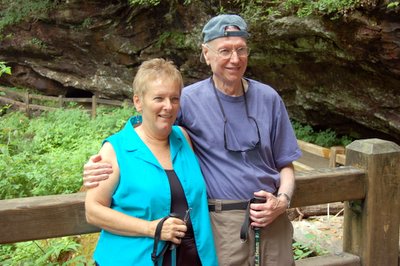
Alice and Bill

Jeannie and David
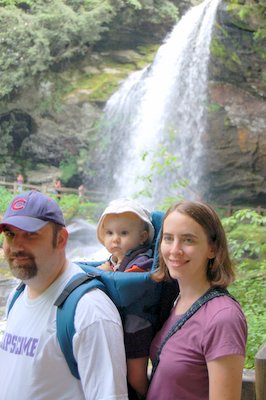
Matt, Eli, and Laura
published by Jonathan on Wed, 08/02/2006 - 21:31
July 2006 seems to be the month of ironic DUI incidents... First, in mid-July, Peter Coors (executive of the Coors Brewing Company) lost his license as a result of a May incident. From an AP article on MSNBC.com:
Beer baron Peter Coors' driver's license has been revoked after his arrest for drunken driving following a wedding celebration. Hearing officer Scott Garber ruled Friday that Coors did not stop at a stop sign and was driving impaired on May 28. Coors, 59, said he had consumed a beer about 30 minutes before leaving the wedding, the Rocky Mountain News reported Saturday. He faces a July 20 arraignment and has 30 days to appeal the revocation.
Then, at the end of July, Mel Gibson (who has long been dogged by charges of anti-Semitism due to his Passion of the Christ movie and statements about the holocaust made by his father) was arrested for DUI and made sexist and anti-semitic comments. Slate.com described the controversy and showed some of the police report here.
published by Jonathan on Wed, 08/02/2006 - 20:56
Churches, are you paying attention? People are depending on family more and more but live away from family more and more. Providing the network that people can lean on when they are in need is right up the church's alley. From a USA Today article by Janet Kornblum titled "Study: 25% of Americans have no one to confide in":
Americans have a third fewer close friends and confidants than just two decades ago - a sign that people may be living lonelier, more isolated lives than in the past. In 1985, the average American had three people in whom to confide matters that were important to them, says a study in today's American Sociological Review. In 2004, that number dropped to two, and one in four had no close confidants at all… The percentage of people who confide only in family increased from 57% to 80%, and the number who depend totally on a spouse is up from 5% to 9%, the study found. "If something happens to that spouse or partner, you may have lost your safety net," Smith-Lovin says… The chief suspects: More people live in the suburbs and spend more time at work, Putnam says, leaving less time to socialize or join groups. Also, people have more entertainment tools such as TV, iPods and computers, so they can stay home and tune out. But some new trends, such as online social networking, may help counter the effect, he says.
published by Jonathan on Tue, 08/01/2006 - 22:49
We had Eli's first birthday party a little early, opening presents in the afternoon and having cake and ice cream after dinner. Joel, Denise, and two-week-old Jacob joined us for dinner. Their other three kids were spending the week in eastern NC with their Aunt Tonya.

Aunt Kathryn

Eli
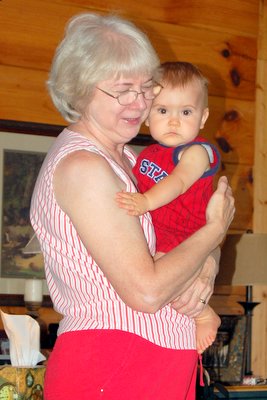
Grandma Moore and Eli
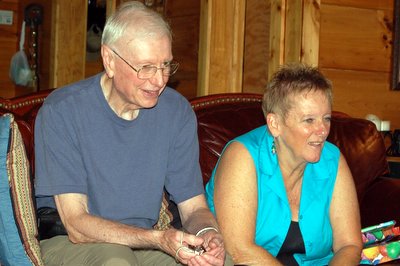
Bill and Alice
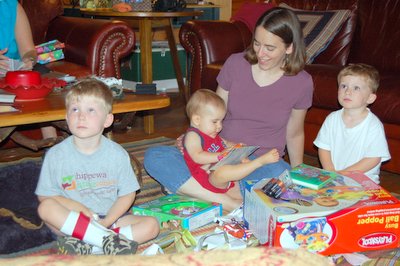
opening Eli's presents
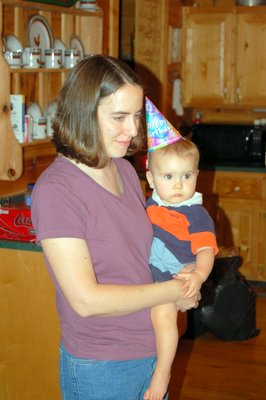
Laura and Eli

Denise
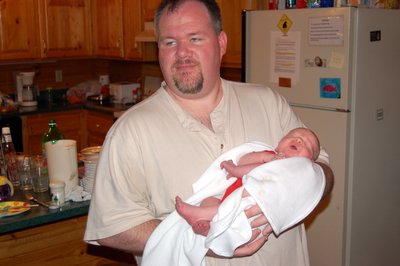
Joel and Jacob
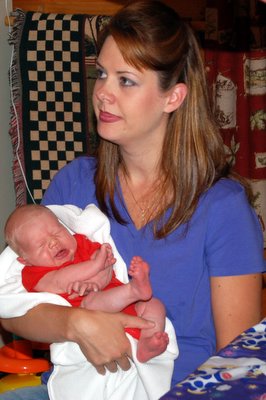
Denise and Jacob
published by Jonathan on Tue, 08/01/2006 - 22:34
From an article of the same title by Peter Smith of The Courier-Journal:
In another setting it would have just been a switch in style: a praise band with guitars and drums opening a worship service, then giving way to a choir weaving tight, multi-part harmonies a capella -- without musical accompaniment. The display of musical variety at the Kentucky International Convention Center this week was also a theological statement. Members of two church movements have been holding services of reconciliation this week to mark the 100th anniversary of their bitter division over whether the Bible allows the use of musical instruments in church. The gathering is taking place at the North American Christian Convention, an annual gathering of independent Christian Churches and Churches of Christ. The difference this year is that another group of Churches of Christ -- those who traditionally don't use musical instruments -- are also there, with some of them preaching and leading worship. "Thick books have been written on what caused the split," said Rick Atchley, pastor of Richland Hills Church of Christ in Fort Worth, Texas. But "for many in my generation, the interest isn't so much in understanding what happened as … we don't want to pass it on. I do believe in an increasingly secular world, people of faith are finding reasons to fellowship with people who believe in the same savior and the same Scripture." Jeff Walling, pastor of a non-instrumental Church of Christ in North Carolina, demonstrated that view last night when he gave his Bible, a gift from his mother, to Dave Stone, senior minister of Louisville's Southeast Christian Church. "It's time to be family," Walling told the crowd… Both movements consist of conservative evangelical churches rooted in an early American revival movement -- led in part by Kentuckian Barton Stone -- that sought to drop all denominational structures and restore the model of the early church. In the 1906 split, some Churches of Christ, mainly in the South, concluded that they shouldn't use musical instruments because the New Testament never calls for them. Scholars say there was more going on behind the scenes: different methods of biblical interpretation, lingering Civil War tensions and the sense that richer churches -- those able to afford organs -- were becoming too liberal. Today, although their churches govern themselves, each movement has its own network of Bible colleges, publications and conferences. Each movement has roughly 1.5 million adherents… A third branch of the movement, the Christian Church (Disciples of Christ), has become a more structured denomination. North American Christian Convention's executive director, Allan Dunbar, said that while this year's focus is on reconciliation with the Churches of Christ, he hopes he hopes rank-and-file Disciples can participate in future conventions.
An article in The Christian Chronicle gives more details about the reconciliation.
Pages